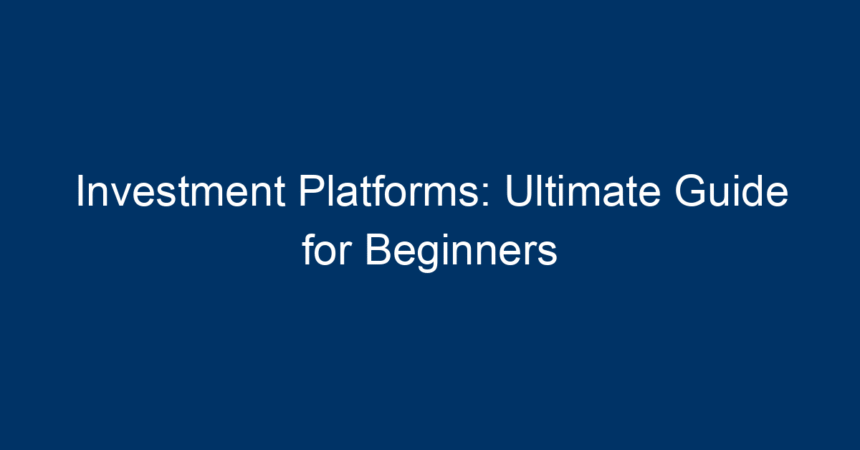Investing can seem like a daunting task, especially for beginners. With an array of available options and terminologies, it’s easy to feel overwhelmed. However, understanding the concept of investment platforms can significantly demystify the process. In this comprehensive guide, we will explore everything you need to know about investment platforms, their benefits, various types, how to choose the right one, and actionable insights that will set you on the path to successful investing.
What Are Investment Platforms?
Investment platforms are digital services that allow individuals to manage their investments online. They provide tools and resources for trading stocks, bonds, mutual funds, ETFs, and other financial instruments. These platforms enable investors to research markets, execute trades, and monitor their portfolios—all from the convenience of their computers or mobile devices.
The Rise of Investment Platforms
The rise of technology has revolutionized the investment landscape. Traditional brokerage firms have moved online, and new players have entered the market, making investing more accessible to everyone. In a world where information is at your fingertips, investment platforms have democratized investing, allowing novices and seasoned traders alike to make informed financial decisions.
Types of Investment Platforms
Understanding the various types of investment platforms is crucial for beginners. Each offers unique features catering to different investment styles and preferences.
1. Brokerage Platforms
Brokerage platforms are perhaps the most well-known type of investment platform. They allow users to buy and sell stocks and other securities. Brokerage platforms can be classified into two categories:
-
Full-Service Brokerage: These offer personalized services, including financial advice, research, and retirement planning. They tend to charge higher fees.
- Discount Brokerage: These platforms provide a more self-directed approach, allowing users to trade with lower fees but with less personal guidance.
2. Robo-Advisors
Robo-advisors are automated investment platforms that use algorithms to manage portfolios based on individual risk tolerance and investment goals. They are an excellent option for beginner investors who prefer a hands-off approach.
3. Peer-to-Peer (P2P) Lending Platforms
These platforms allow you to lend money directly to individuals or small businesses. Participants earn interest on their loans, creating an attractive investment alternative. However, they come with higher risk due to the potential for borrower defaults.
4. Real Estate Investment Platforms
Real estate crowdfunding platforms provide opportunities to invest in real estate projects without purchasing entire properties. This can be a good way for beginners to enter the real estate market with smaller amounts of capital.
5. Cryptocurrency Exchanges
For individuals interested in the burgeoning field of cryptocurrencies, dedicated cryptocurrency exchanges offer investment platforms specifically for trading digital assets.
Benefits of Using Investment Platforms
The advantages of investment platforms cannot be overstated, especially for beginners:
1. Accessibility
Investment platforms allow you to invest from the comfort of your home or on the go via mobile apps. No more scheduling inconvenient meetings with brokers!
2. Lower Fees
Many investment platforms, especially discount brokerages and robo-advisors, minimize fees, making investing more affordable for beginners.
3. Educational Resources
Numerous platforms provide educational content to help users enhance their investing knowledge. From blogs and webinars to research reports, these resources are invaluable for novice investors.
4. Tools and Features
Most platforms come equipped with advanced tools for market analysis, real-time data, and portfolio tracking, empowering users to make informed decisions.
5. Diversity of Investment Options
Investment platforms often offer various investment vehicles, from stocks and bonds to ETFs and mutual funds, allowing for portfolio diversification.
How to Choose the Right Investment Platform
Choosing the right investment platform involves several critical factors:
1. Identify Your Investment Goals
Determine what you want to achieve with your investments. Are you looking for long-term growth, income generation, or something else? Your goals will guide your platform choice.
2. Consider Fees
Different platforms have different fee structures. Look for platforms with transparent fees to avoid surprises. Pay attention to trading commissions, management fees, and withdrawal fees.
3. Evaluate User Experience
A user-friendly interface can significantly affect your investing experience. Try to find platforms that offer intuitive navigation, simple trading processes, and responsive customer support.
4. Research Investment Options
Ensure the platform offers the types of investments you’re interested in. If you’re keen on specific assets like cryptocurrencies or real estate, check if the platform supports them.
5. Look for Reviews and Ratings
Research online reviews and ratings of various investment platforms. User feedback can provide insights into performance, reliability, and overall experience.
Getting Started with Investment Platforms
Once you have chosen an investment platform, here are actionable steps to get started:
1. Open an Account
Sign up for an account on the platform of your choice. Most platforms require personal information, such as your name, address, and Social Security number for tax purposes.
2. Fund Your Account
Choose a funding method (bank transfer, credit card, etc.) to deposit money. Be mindful of minimum deposit requirements.
3. Explore the Features
Familiarize yourself with the platform’s features. Utilize the educational resources, research tools, and trading functionalities to enhance your investing skills.
4. Start Small
As a beginner, consider starting with a smaller investment. This will allow you to gain confidence without exposing yourself to significant risk.
5. Monitor and Adjust
Regularly monitor your investments and make adjustments as needed. Keep an eye on market trends and educate yourself continuously to improve your decision-making.
Conclusion: Take Action
Investment platforms have revolutionized how individuals approach investing, making it more accessible than ever. As you embark on your investment journey, remember the importance of education and due diligence.
By understanding your investment goals, evaluating platforms carefully, and leveraging educational resources, you can navigate the world of investments effectively. So, take the leap—start exploring investment platforms today, and set yourself on the path toward financial independence!
Whether you’re interested in stocks, real estate, or cryptocurrencies, there’s an investment platform out there that’s perfect for you. Equip yourself with knowledge, take smart risks, and watch your wealth grow!




